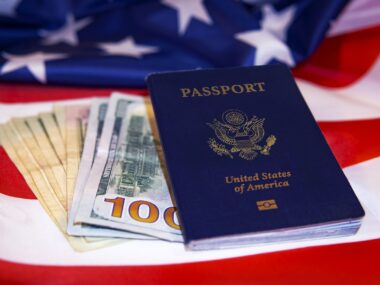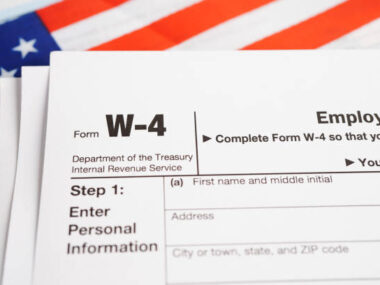America is known as the land of opportunities, famous for its advanced industries and technology. Many Nigerians dream of living and working in the U.S. because it offers better job opportunities, a higher quality of life, and a chance to experience a diverse culture.
Getting a U.S. visa can be tough and expensive. It would be best if you often had a lot of money and must be ready to move to the U.S. to work onsite. But there’s good news! In 2024, there are $25,000 visa sponsorship opportunities that can help cover these costs, making it easier for you to live and work in America.
This guide will give you all the information you need to take advantage of this opportunity and make your American Dream come true in 2024.
Types of Sponsorships
There are several types of U.S. visas available for foreign nationals, each serving different purposes. The most common categories include:
1. Employer Sponsorship
Employer sponsorship is a process where a U.S. employer supports a foreign national’s application for a work visa, facilitating their employment and legal stay in the United States. This sponsorship often covers various expenses related to obtaining the visa, including application fees, legal costs, and sometimes relocation expenses. Some of the most common types include:
- H-1B Visa: Designed for speciality occupations requiring a bachelor’s degree or higher in fields like engineering, computer science, medicine, and scientific research.
- H-2A Visa: Issued to temporary agricultural workers employed on U.S. farms during peak harvest seasons. Employers must prove a lack of domestic workers willing to perform the labor.
- H-2B Visa: This visa is similar to H-2A but for temporary non-agricultural workers in industries like landscaping, construction, and hospitality. It fills temporary jobs where there is a shortage of qualified American workers.
- L-1 Visa: For intracompany transfers of employees with specialized knowledge or managerial/executive skills to a parent, branch, or affiliate company in the U.S. It facilitates the transfer of qualified employees within the same multinational company.
2. Family Sponsorship
Family sponsorship allows U.S. citizens and permanent residents to bring relatives to the U.S. by sponsoring them for green cards. Eligible sponsors include U.S. citizens (sponsoring spouses, children, parents, and siblings) and permanent residents (sponsoring spouses and unmarried children).
The process involves filing Form I-130 with USCIS to establish the relationship. This sponsorship promotes family reunification and offers a pathway to permanent residency and citizenship.
3. Other Sponsorship Programs
While less common, other avenues for obtaining U.S. visas through sponsorship exist:
- EB-5 Investor Visa: This visa grants permanent residency to foreign nationals who invest a significant amount of capital (currently $1.8 million, with reduced amounts in certain areas) in a U.S. commercial enterprise that creates at least 10 full-time jobs for U.S. workers.
- Humanitarian Programs: Specific programs, like the Uniting for Ukraine initiative, allow U.S. individuals and organizations to financially sponsor Ukrainian refugees for temporary stays in the U.S.
Understanding these sponsorship types can help you determine the best pathway for your move to the United States. Always consult the official U.S. government immigration website for the most accurate and up-to-date information.
Job Sectors Offering $25,000 Salary and Sponsorship
Securing a job in the U.S. with a $25,000 salary and visa sponsorship is achievable in several industries. Here are key sectors where such opportunities are available:
Information Technology (IT), Healthcare, Engineering, Education, Finance, Hospitality and Tourism, Agriculture, Construction, Retail and Customer Service.
Emerging Sectors for $25,000 U.S. Visa Sponsorship Opportunities in 2024
Here are some of the promising industries for 2024:
1. Renewable Energy
The renewable energy sector is growing rapidly as the U.S. moves towards sustainable energy solutions. Companies in this industry are seeking professionals in solar, wind, and other renewable technologies. Roles such as solar panel installers, wind turbine technicians, and energy analysts often come with visa sponsorship and competitive salaries.
2. E-Commerce
The rise of online shopping has created numerous opportunities in the e-commerce sector. Companies are hiring for positions in logistics, customer service, and digital marketing. With the continuous expansion of e-commerce giants like Amazon and emerging startups, there are plenty of entry-level and specialized roles that offer visa sponsorship.
3. Cybersecurity
As cyber threats become more sophisticated, the need for cybersecurity professionals is on the rise. Companies across various sectors are looking for experts to protect their data and systems. Roles in this field, such as cybersecurity analysts, ethical hackers, and security consultants, often offer visa sponsorship and competitive pay.
4. Remote Work Services
The shift towards remote work has created new opportunities in tech support, virtual assistance, and remote project management. Companies are increasingly open to hiring remote workers from around the globe, offering visa sponsorship to ensure they can attract the best talent. These roles are especially appealing as they offer flexibility and the chance to work from anywhere.
What Are the Easiest Jobs to Get with $25,000 U.S. Visa Sponsorship in the U.S., and What Are Their Annual Salary Ranges?
Here are some of the easiest jobs to get, along with their typical annual salary ranges:
1. Hospitality and Tourism
- Hotel Staff: $24,699 – $63,302
- Restaurant Workers: $27,300 – $44,700
- Tour Guides: $18,000 – $85,633
- Event Coordinators: $31,000 – $84,335
The hospitality industry, including hotels and restaurants, often seeks managers with international experience. This demand makes it relatively easier to find visa sponsorship opportunities in this field.
2. Healthcare
- Registered Nurses: $60,000 – $120,000
- Physical Therapists: $70,000 – $100,000
- Medical Technologists: $50,000 – $80,000
The healthcare industry consistently needs professionals at various levels. High demand for registered nurses, physical therapists, and medical technologists often comes with attractive salaries and sponsorship opportunities.
3. Agriculture
- Farm Workers: $21,000 – $33,000
- Harvesting Laborers: $25,270 – $37,990
- Greenhouse Workers: $23,000 – $47,783
- Dairy Farm Assistants: $31,358 – $38,218
Seasonal and temporary agricultural jobs are in high demand, especially during planting and harvest times. These roles often include visa sponsorship to address the shortfall of local labor.
4. Construction
- Construction Laborers: $31,000 – $46,416
- Carpenters: $31,000 – $73,674
- Electricians: $47,800 – $102,300
- Plumbers: $48,119 – $81,626
Construction jobs are in high demand in the US due to ongoing infrastructure projects, urban development, and the need for housing, which drive the continuous need for skilled labour in the construction industry.
5. Home Health Aides and Caregivers
- Home Health Aides: $23,910 – $42,450
- Personal Care Aides: $27,100 – $37,280
There is a significant demand for home health aides and caregivers to support the aging population. These roles often require basic medical knowledge and a compassionate attitude.
6. Tech Jobs
- Software Engineer: $104,882 – $172,100
- Data Scientist: $101,283 – $170,260
- Systems Engineer: $93,500 – $167,480
- Web Developer: $77,300 – $135,300
The tech industry is growing fast in the U.S., creating jobs for foreign workers with skills in programming, cloud computing, and different programming languages.
7. Education Support
- Teacher Assistants: $20,000 – $35,000
- Early Childhood Educators: $25,000 – $50,000
Education support roles, especially in early childhood and special education, are in demand. Schools and educational institutions may offer visa sponsorship to fill these critical positions.
Important Considerations
- Salary Variability: Salaries can vary significantly based on geographic location, professional experience, and the employer’s specific policies.
- Industry Demand: Research the high-demand occupations within your industry to align your career goals with market needs.
- Skill Development: Enhance your skills and qualifications to increase your competitiveness as a job candidate.
Unskilled Jobs with Visa Sponsorship in the U.S. and Their Annual Salary Range
Visa sponsorship for unskilled jobs, typically requiring little to no formal education or training, offers opportunities in various sectors:
1. Live-in Home Care Worker: $20,000 – $52,000
2. Landscaping and Groundskeeping Laborer: $22,800 – $48,310
3. Amusement Park or Carnival Worker: $20,000 – $60,000
4. Housekeeping Staff (Hotels or Private Residences): $20,000 – $43,000
Finding Sponsorship for Unskilled Jobs
- Target Specific Industries: Focus on sectors known for hiring international workers, such as seasonal hospitality businesses.
- Direct Care Positions: Opportunities may exist in roles like live-in home care for elderly or disabled individuals that offer sponsorship.
- Family Sponsorship: If you have a family member who is a U.S. citizen or green card holder, they can sponsor you for permanent residency, expanding your job prospects.
Key Considerations
- Lower Salary Expectations: Unskilled jobs generally pay less compared to skilled professions.
- Residential Requirements: Some positions may require living with your employer.
- Legal Guidance: Due to the complexities involved, it’s advisable to seek advice from an immigration attorney when pursuing sponsorship for unskilled jobs.
Securing visa sponsorship for unskilled jobs can be challenging, so it’s essential to manage expectations and explore all available avenues, including family sponsorship where applicable.
ELIGIBILITY CRITERIA FOR $25,000 U.S. VISA SPONSORSHIP OPPORTUNITIES IN 2024
To qualify for the $25,000 U.S. visa sponsorship, candidates must meet specific requirements. Eligibility depends on various factors, including the specific visa category and compliance with U.S. immigration laws. Here’s a breakdown of the common criteria:
Employer Sponsorship:
H-1B Visa: Worker Requirements:
- Education: A bachelor’s degree or equivalent in the specialty occupation (or higher degree in specific fields) is mandatory.
- Work Experience: Relevant field experience is typically required, varying by occupation and employer criteria.
- Job Offer: A valid, full-time job offer from a U.S. employer willing to sponsor the visa for a specialized occupation is essential.
Employer Requirements: Occupation Classification: The employer must prove the position qualifies as a “specialty occupation” per the U.S. Department of Labor.
PERM Labor Certification: Before filing the H-1B petition, employers generally start the PERM labor certification process. This involves advertising the position to U.S. workers and demonstrating the unavailability of qualified American candidates, justifying the need for a foreign worker.
Family Sponsorship:
Immediate Relatives:
- Relationship: Applicants must be spouses, unmarried children under 21, or parents of a U.S. citizen (if the citizen is at least 21).
- Proof of Relationship: Essential documentation includes marriage certificates, birth certificates, or adoption decrees.
Sponsor’s Financial Means:
- U.S. citizen sponsors must demonstrate financial capability through an Affidavit of Support (Form I-864), often including income tax returns, bank statements, and employment proof.
Other Sponsorship Programs:
EB-5 Investor Visa:
- Investment Amount: Requires a minimum investment of $1.8 million ($900,000 in specific high-unemployment areas) in a U.S. commercial enterprise.
- Job Creation: Direct creation of at least 10 full-time jobs for U.S. workers.
- Active Involvement: Applicants must actively manage and operate the U.S. business.
Financial Resources:
- Additional financial resources are necessary to support the applicant and their family throughout their U.S. stay.
Important Note:
These criteria are general; specific requirements may vary by visa category. Always consult the official USCIS website or an immigration attorney for the latest eligibility details for each program.
Application Process
The application process for sponsored visas generally involves multiple stages, although specific procedures may vary based on the visa category:
- Petition Filing:
Employer Sponsorship: The U.S. employer submits a petition to USCIS, typically Form I-140, Immigrant Petition for Alien Worker, to initiate sponsorship. This petition demonstrates the need for the foreign worker and the employer’s commitment to sponsoring the visa.
If applicable, the PERM labor certification process is also started at this stage. This process includes advertising the position to U.S. workers and proving the absence of qualified American candidates.
Family Sponsorship:
A U.S. citizen or green card holder files a petition with USCIS, usually Form I-130, Petition for Alien Relative. This form establishes the qualifying family relationship and initiates the immigration process for the sponsored individual.
Other Sponsorship Programs:
For programs like the EB-5 investor visa, applicants follow specific program requirements, which may include submitting detailed investment plans and financial documentation.
- Supporting Documents:
All sponsorship types require extensive supporting documentation, including: Educational credentials (diplomas, transcripts), Verification of work experience (employment letters, pay stubs), Proof of qualifying relationship (marriage certificate, birth certificate), Results of medical examinations, Financial documents (bank statements, tax returns).
Passports and travel documents
- Biometric Data Collection:
Applicants must provide biometric data (fingerprints and photographs) at designated USCIS Application Support Centers (ASCs).
- Visa Interview:
Upon petition approval, the sponsored individual attends a visa interview at a U.S. embassy or consulate in their home country. This interview assesses eligibility and suitability for the visa based on the application and supporting documents.
- Processing and Decision:
USCIS or the U.S. Department of State processes the application and issues a final decision on visa approval. Processing times vary depending on the visa category and current workload.
Employer Responsibilities
Employers sponsoring visas must fulfill several obligations, which include:
- Paying Prevailing Wage: Ensuring that sponsored employees receive at least the prevailing wage for their job in the local area, preventing undercutting of local wages.
- Compliance with Labor Laws: Maintaining working conditions and benefits comparable to those provided to U.S. workers, without adversely affecting their employment conditions.
- Filing Fees: Covering various fees related to the visa sponsorship process, such as those for the LCA, Form I-129, and potentially expedited processing fees.
Additional Considerations
- Fees: Each stage of the application incurs fees, including filing, biometric, and visa application fees.
- Medical Examinations: Some applicants may need specific medical tests as required by USCIS.
- Legal Guidance: It is advisable to seek advice from an immigration attorney to ensure compliance with regulations and enhance the chances of a successful application.
It’s important to note that procedures can vary depending on the visa category. For precise requirements, it’s recommended to research thoroughly and consult with immigration professionals for personalized guidance.
Conclusion
Unlocking $25,000 U.S. visa sponsorship opportunities can pave the way for a brighter future in America. By understanding the types of visas available, knowing where to find sponsorship opportunities, and preparing a strong application, you can increase your chances of success. While the process can be challenging, the rewards of living and working in the United States are well worth the effort. Start your journey today and take the first step toward achieving your American dream in 2024.
Frequently Asked Questions (FAQ) About U.S. Visa Sponsorship
What Types of Jobs Offer Visa Sponsorship?
Jobs in high-demand fields like technology, healthcare, education, engineering, finance, and hospitality often offer visa sponsorship.
Can I apply for a U.S. visa without a job offer?
Yes, you can apply for certain U.S. visas without a job offer. Examples include student visas (F-1 and M-1), tourist and business visas (B-1/B-2), the Diversity Visa Lottery (Green Card Lottery), investor visas (EB-5), and certain humanitarian visas like asylum or refugee status. Each visa type has its own eligibility requirements and application processes.
How Long Does the Visa Sponsorship Process Take?
The timeline varies depending on the visa type and processing times. It can range from a few months to over a year.
Do I Need an Immigration Attorney?
While not mandatory, consulting with an immigration attorney can help you navigate the visa sponsorship process, ensure compliance with immigration laws, and address specific legal questions.
Can Family Members Accompany Me?
Depending on the visa type, some visas allow accompanying family members (spouse and unmarried children under 21) to join the visa holder in the U.S.
What Should I Do After Receiving Visa Sponsorship?
Upon receiving visa sponsorship, follow instructions from your employer and immigration authorities to complete the visa application process, prepare for relocation, and comply with visa conditions.
Click the link below to Get the visa sponsorship Opportunity





